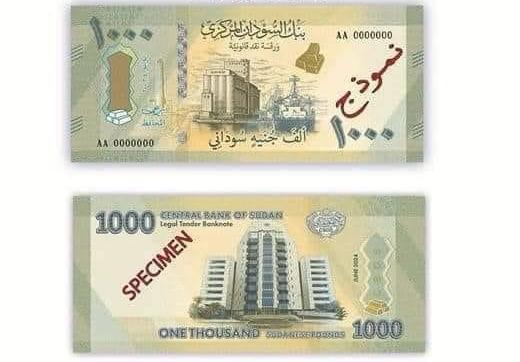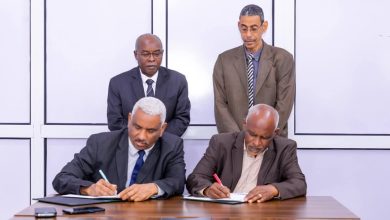Economic
Currency Change: Combating Looting Operations

Report by – Rehab Abdullah
Since the outbreak of conflict between the Sudanese Armed Forces and the Rapid Support Forces militia in mid-April 2023, experts have increasingly called for a change in Sudan’s currency or the elimination of high-value denominations. The main purpose of this suggestion is to impose significant losses on the Rapid Support Forces, which have looted the assets of the Sudanese people, banks, and financial institutions. Despite these expert recommendations, the Central Bank of Sudan has remained silent. Recently, it even issued a new 1,000-pound banknote bearing the signature of the current governor, Barai Siddiq Ali, and announced that the previous version of the 1,000-pound note remains valid, a decision that has faced criticism from various economic circles.
Issuing a 1,000-pound Banknote The Central Bank of Sudan announced that it would issue a 1,000-pound banknote in the coming period, citing its mandate under the Central Bank Act of 2002 and its responsibility to protect the national currency, stabilize its exchange rate, and support economic stability. This decision is seen as an attempt to address the effects of the ongoing conflict, especially the extensive looting by the rebel militia of the Central Bank’s headquarters and the Sudan Currency Printing Press in Khartoum. The looting resulted in the circulation of large amounts of counterfeit or uncertified banknotes in the 1,000-pound and 500-pound denominations, which has significantly increased liquidity levels and negatively impacted price stability.
Non-Legal Tender Currency The Central Bank’s announcement clarified that commercial banks and their branches would continue to accept deposits of 1,000-pound and 500-pound banknotes from the public, allowing account holders to access funds through various digital payment methods. Banks will also facilitate account opening for those without bank accounts, enabling them to deposit their cash for banking and electronic services. The Bank will later announce the deadline for ceasing acceptance of the current 1,000-pound and 500-pound notes as legal tender.
Delayed Action Experts have criticized the delay in taking action, as more than a year and a half has passed since the war’s outbreak, with looting and banking thefts affecting private homes and commercial stores. Some argue that this decision should have been made last year to curb theft and protect bank funds, especially since the majority of cash reserves are in high denominations like the 1,000-pound and 500-pound notes.
Currency Change Banking expert Ayman Ahmed considers the Central Bank’s new currency issuance essentially a currency change. In an interview with Al-Ahadath, he expressed hope that this step would curb inflation and restore trust in the national currency among citizens, businesses, and both local and foreign investors. Currency changes could help stabilize the financial system in secure regions and markets, enabling the banking system to fund industries in stable areas.
A Well-Timed Decision
Ahmed praised the timing of the decision, as it follows the relative stabilization of the exchange rate due to recent economic measures. He expects that by February, this change will improve the investment climate and bolster confidence in the Sudanese pound, provided economic stability continues. He suggests that the next step should include reducing reliance on Bank of Khartoum’s app by enhancing banking alternatives, which would strengthen the country’s readiness for reconstruction efforts. He noted that the looted funds mostly circulated into real estate, foreign currency, and precious metals. Ahmed believes the Central Bank holds accurate data on the amount of currency in circulation, both in banks and in its vaults across Sudan.
Non-Legal Tender Denominations Dr. Abdul-Azim Al-Mahal, Dean of the Economics Department at the University of Sudan, reiterated his stance that the 1,000-pound and 500-pound denominations should no longer be considered legal tender. He suggested this step at the onset of widespread bank looting, explaining that designating these notes as non-legal tender would prevent them from purchasing assets such as property, gold, or dollars. Instead, holders would need to exchange them directly at banks.
Warning on Economic Risks Banking expert Waleed Daleel warns that issuing new, high-value currency poses economic risks, predicting it may phase out lower denominations, leading to inflation and increased prices for lower-cost goods. Daleel suggested that enabling electronic transfers between banks would reduce the need for costly currency production. He expressed concerns about potential devaluation of the Sudanese pound, which could further erode economic stability, especially as Sudan is heavily reliant on imports.
A Step Toward Financial Stability Former Secretary General of the Tax Office Ahmed Adam Salem noted that the Central Bank’s decision is long overdue, as looted funds have mostly been converted into foreign currency or used to purchase assets abroad. He indicated that the Central Bank has yet to specify a deadline for the currency change, leaving room for continued counterfeiting.
An Important Step Economist Dr. Mohammed Al-Nayir welcomed the Central Bank’s response to the long-standing call for currency reform, emphasizing that even a late move is better than none. Al-Nayir sees this decision as a means to address longstanding issues within Sudan’s banking sector. He urged the Central Bank to begin implementation promptly to mitigate a potential rush by individuals attempting to exchange stolen currency. Al-Nayir praised the digital transaction focus, noting that such measures require improved network infrastructure and account accessibility for citizens.
Differentiating Replacement from Change
Ahmed Al-Anan, Chairman of the Gum Exporters Association, expects this measure to impact foreign currency markets by reducing demand for local currency in property and other assets. He called for synchronized fiscal and monetary policies, advocating for restrained government spending to enhance financial stability. He hopes to see a specialized committee, composed of the Central Bank, the Ministry of Finance, and production sectors, to develop policies informed by economic conditions and currency replacement outcomes.



